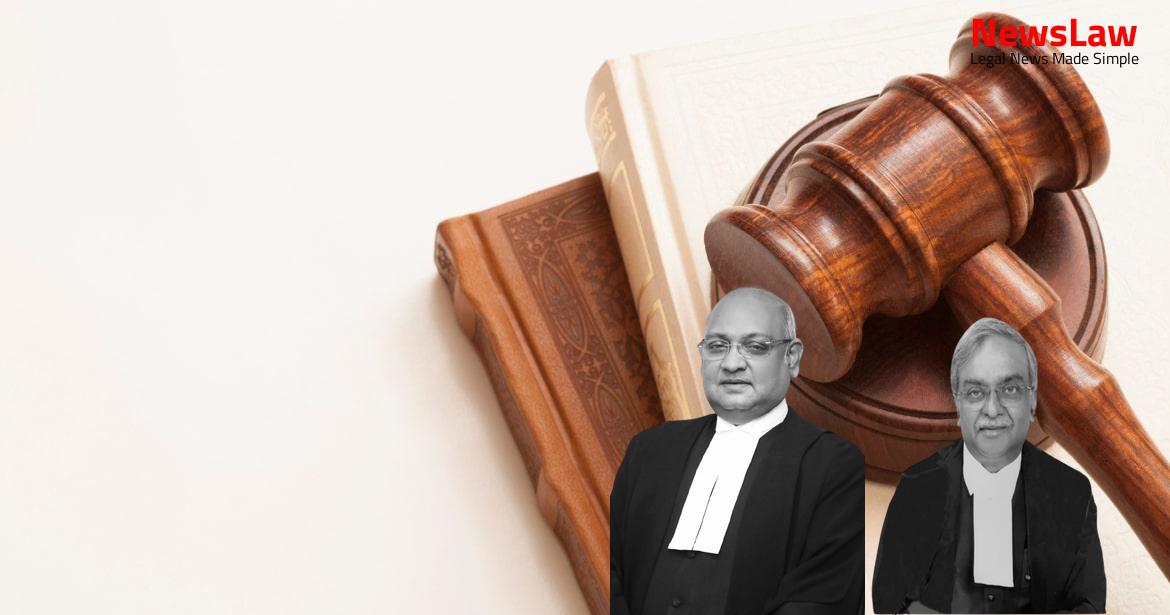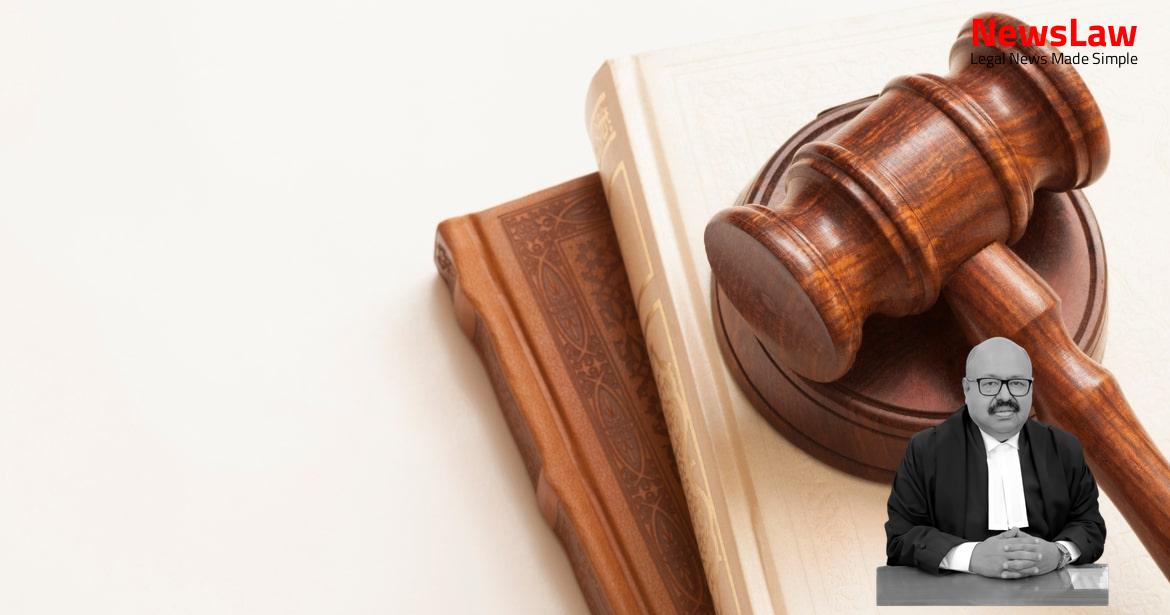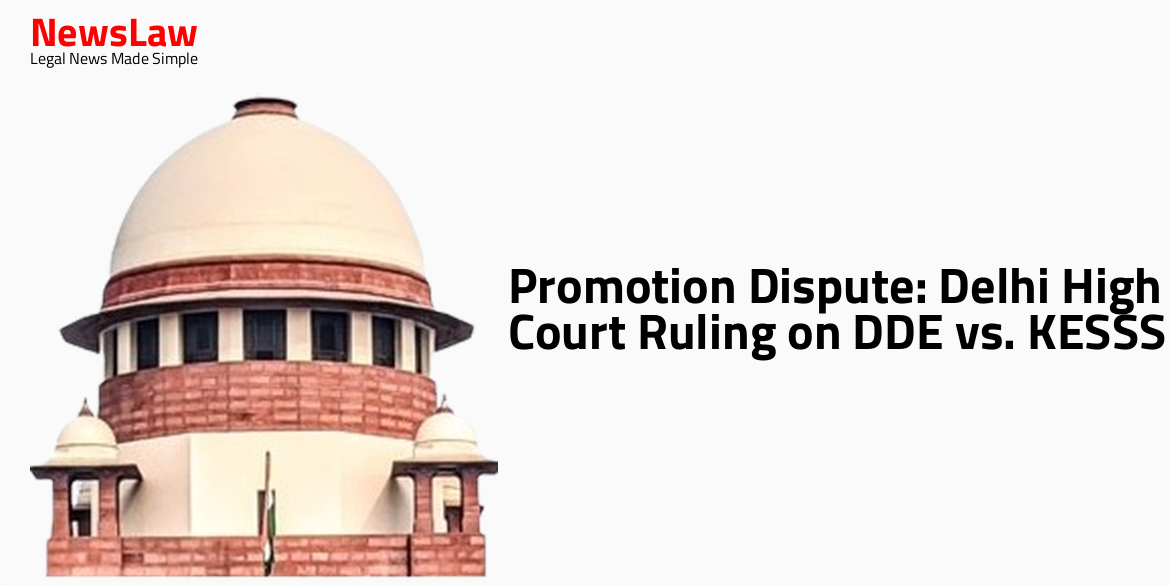Explore the critical analysis by the court on the interpretation of ‘dispute’ in insolvency cases. Discover how the court meticulously examined the legal intricacies to provide clarity and direction in resolving complex disputes within the realm of insolvency law.
Facts
- The respondent company challenged the legality and validity of the awards made by petitions under Section 34 of the Arbitration and Conciliation Act, 1996, which were dismissed by the District Court, Barasat.
- The appellant, an operational creditor, sought to question the order passed by the National Company Law Appellate Tribunal in appeals related to non-payment of operational debts by the respondent company.
- The respondent company asserted that there was a dispute pending in arbitration proceedings which pre-dated the receipt of demand notices, stating that no operational debt was payable.
- Despite the reply sent by the respondent company, the appellant moved the National Company Law Tribunal seeking initiation of Corporate Insolvency Resolution Process for non-payment of operational debts.
- Arbitration proceedings were initiated due to a dispute regarding the supply and payment obligations between the parties, leading to arbitral awards in favor of the appellant.
- The NCLT observed that no arbitration proceedings were pending challenging the award on the date of serving demand notices or filing the application against the Corporate Debtor.
- Referring to the requirements of the Insolvency and Bankruptcy Code, the NCLT noted that no dispute existed on the relevant dates as no proceedings were pending in challenge to the arbitral awards.
- The NCLT cited a previous case and observed that the operational debt became due and payable when the award was confirmed by the District Judge, even though an appeal by the corporate debtor was dismissed in default.
- The Appellate Tribunal found that the operational debt claimed by the appellant was not free from pre-existing dispute.
- The orders dated 30.09.2020 passed by the NCLT, Kolkata Bench, in admitting the application for initiation of CIRP were set aside.
- Elaboration on all factual aspects of the claim and dispute were deemed unnecessary for the purpose of the decision.
Also Read: Court’s Jurisdiction in Re-appraising Arbitrator’s Findings
Issue
- Question before the court was automatic revival of interlocutory orders with restoration of the suit.
- Matter was referred to several decisions by the learned Judges forming majority.
- Determination of revival of ancillary orders depends on the terms of order of dismissal and restoration of the suit.
Also Read: Contrary Directions in Issuance of Letter of Intent
Arguments
- The appellant contends that a dispute must exist prior to the service of the demand notice for an application under Section 9 of the Code to be maintainable.
- Emphasis is placed on Section 8(2)(a) of the Code and the definition of dispute in Section 5(6) of the Code as interpreted in Mobilox Innovations case.
- The minority opinion discusses the distinction between supplemental and incidental proceedings, highlighting the need to preserve parties’ rights pending adjudication.
- The appellant draws attention to the minority opinion’s stance on the legal treatment of accrued rights during the interregnum.
- It is cautioned against interpreting the minority opinion as establishing a new legal principle independent of existing precedents.
- NCLAT wrongly relied on the majority judgment in the case of Vareed Jacob, which held that the interim order was automatically revived upon the restoration of the suit.
- NCLAT failed to acknowledge that all interim orders cannot be treated equally as per the observations in the majority judgment.
- The minority view in Vareed Jacob concerning the legal treatment of rights accrued between dismissal and restoration was not considered, despite its relevance.
- A decision in Addagada Raghavamma & Anr. v. Addagada Chenchamma & Anr. was cited to emphasize that the doctrine of relation back must have limitations to not affect vested rights.
- After comprehensive review, the appeals lack substance and are not eligible for admission.
- The appellant claims to be an operational creditor due to a claim against the respondent company in arbitration which resulted in arbitral awards favoring the appellant.
- Challenges to the arbitral awards ended with the dismissal of appeals under the Act of 1996, leading to demand notices sent to the corporate debtor for the defaulted amount.
- Events occurring after the issuance of demand notices are deemed irrelevant.
Also Read: Application for Stay in Civil Suit Rejected: Court’s Legal Analysis
Analysis
- The appellant attempted to use the default dismissal of appeals for initiation of CIRP but the grounds were lost when applications under Section 9 of the Code were filed.
- The real issue is about the pre-existing dispute regarding the money claimed by the operational creditor.
- The default dismissal of appeals represents a partial eclipse putting the dispute in hibernation momentarily.
- Interpreting Section 8(2)(a) to require an Arbitral Award pending at the exact date of the Demand Notice issuance is misconstrued.
- The Adjudicating Authority’s findings were affirmed by the Appellate Tribunal, asserting that the Code provisions override the Act of 1996.
- The appellant’s submission seeking CIRP initiation against the respondent company contradicts the fundamental principles of the Insolvency and Bankruptcy Code, 2016.
- The operational debt in this case is not an undisputed debt.
- The Code should not be used as a substitute for debt enforcement procedures by operational creditors.
- The majority opinion must prevail in cases of a divergence of views within a Bench.
- Applications for CIRP initiation were rightly rejected under Section 9(5)(ii)(d) if a notice of dispute had been received.
- The NCLT admitted the applications under Section 9, leading to the initiation of CIRP against the respondent company.
- The NCLAT referred to precedents in Mobilox Innovations and K. Kishan to determine the existence of a pre-existing dispute before the demand notices were issued.
- The appellant’s reference to the minority opinion in Vareed Jacob was deemed misdirected and not applicable.
- The Insolvency process cannot be put into operation without an adjudication on the applicability of Section 14 of the Limitation Act in certain clear cases.
- The NCLAT held that restoration of appeal relates back to the original filing date, showing a pre-existing dispute prior to the demand notice issuance.
- Disputes in insolvency resolution cases must be genuine and not spurious.
- Dispute as defined in Section 5(6) of the Code includes a suit or arbitration proceedings regarding the amount of debt, quality of goods or service, or breach of representation or warranty.
- Operational creditors can initiate insolvency resolution by delivering a demand notice of unpaid operational debt to the corporate debtor.
- The demand notice must be in the prescribed form and manner.
- The corporate debtor must respond within ten days of receiving the demand notice, bringing any dispute or unpaid operational debt to the operational creditor’s attention.
- The NCLT proceeded from an incorrect angle in its order on 30.09.2020
- The appeals were restored on the date of filing the applications under Section 9
- The hyper-technical stance of the appellant was not valid
- The NCLT misconstrued the clear expositions in K. Kishan (supra)
- The NCLAT rightfully set aside the orders of the NCLT and closed proceedings against the respondent company
- No reason for interference by the appellant
Decision
- On 02.04.1973, Suit No 209 of 1969 was dismissed in default.
- On 25.06.1969, defendant No 3 filed Suit No 209 of 1969 to set aside the decree dated 21.05.1964.
- All pending applications are disposed of.
- The appeals fail and are dismissed.
Case Title: M/S JAI BALAJI INDUSTRIES Vs. D.K. MOHANTY (2021 INSC 590)
Case Number: C.A. No.-005899 / 2021



